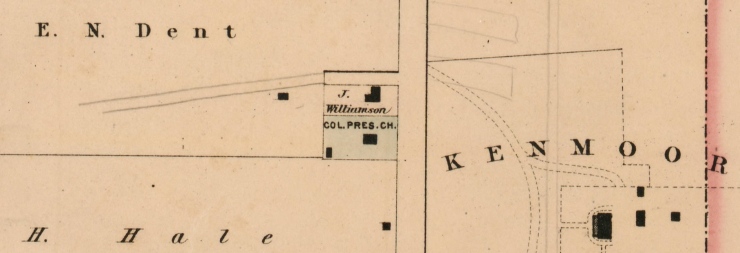Presbyterians Active in Franklin County after the Civil War
The national Presbyterian Church supported the development of churches and schools in Louisburg and Franklinton after the Civil War. Through the efforts of local citizens and missionaries from elsewhere, this denomination planted seeds that continue to bear fruit today.
According to Mrs. Ephraim N. (Lucy) Dent, who published an article in The Africo-American Presbyterian (Charlotte) in 1936, the church's "Freedmen's Board" in 1865 sent two white missionaries, Misses Miller and Henderson, to Louisburg. "Though they were the victims of prejudice even among their own race," Mrs. Dent recalled, they undertook important work. The local hotel refused to offer them accommodations, so they rented a two-room log cabin on the outskirts of town. Here they taught classes during the week and started a Sunday school. Mrs. Dent remembered that these women were followed by two more white women, Miss Gross (1869) and Miss Russell (1871). Subsequently, the church dispatched the Rev. Joseph Platt as a stated supply pastor, and he held services once a month in the same log structure.
Mrs. Dent recalled that local African Americans, some of whom had worshipped at the Methodist church, helped to establish what is known today as St. Paul Presbyterian Church. She remembered that the Rev. Calvin McCurdy and John Williams played important roles in this process. In April 1872, the trustees of the "Colored Presbyterian Church of Louisburg"-Henry Fuller, Jacob Evans, Henderson Dunston, Abram Kelly, and Calvin Yarborough-purchased a lot adjacent to the property of John H. Williamson, on the west side of South Main Street. The map of Louisburg published around 1882 by O. W. Gray & Son shows the location of this property and the church situated on it.

Portion of Gray map of Louisburg (ca. 1882), showing the Presbyterian church on South Main Street, courtesy of the North Carolina Collection, University of North Carolina at Chapel Hill.

Engraving of Moses Aaron Hopkins from The River Press (Fort Benton, Mont.), October 21, 1885.
The Rev. Moses Aaron Hopkins, a former slave who in 1874 earned a four-year degree from Lincoln University and then completed divinity studies at Auburn Theological Seminary in New York, moved to Franklinton in June 1877, to work on behalf of the Presbyterian Church. He founded Albion Academy, a school for African Americans, and served a church there, but also worked in Louisburg. Writing in the Record of the Presbyterian Church in the United States in 1881, Hopkins said the church in Franklinton had grown from 23 to 57 members. The congregation in Louisburg had ballooned to 106 members, perhaps as a result of a large revival he had held. Hopkins found the growth of the congregation in Louisburg to be encouraging, but lamented the condition of the church: "Last Sabbath it was almost impossible to find a dry place in the building we worship in, it leaked so badly." Hopkins remained in the area until 1885, when he was appointed United States Minister Resident and Consul General to Liberia.
Recalling the early days of the church in Louisburg, Mrs. Dent said that "in 1880 Rev. Armstrong was sent to the field as Stated Supply, the first minister to live on the field. His work resulted in a church building being started. Dr. John A. Savage took the field in 1885 and completed the church." Savage also replaced Hopkins as the head of Albion Academy.
The trustees of St. Paul Presbyterian Church purchased a lot on the opposite side of Main Street in 1906 and subsequently built the present brick building. It remains a vital force in the community.
Published in The Franklin Times on March 26, 2015.
Maury York is director of the Tar River Center for History and Culture at Louisburg College.

